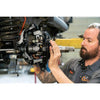
Warning Signs of a Failing Transfer Case
Transfer cases are used in AWD and 4WD vehicles and are responsible for directing power to both axles. While torque from the engine is sent to one axle at all times, it is only sent to both axles when the driver wants or needs the additional power. This is particularly important during inclement weather conditions, when having power directed at all four tires aids in traction and assists with accident avoidance in rough terrain.
A transfer case is an important (but little-discussed) undercar component that can directly affect the safety of your customers. Especially when the temperatures start to drop and snow appears in the forecast, it’s important to take preventative steps to ensure that a customer’s AWD or 4WD system will engage when it’s called upon.
Read on to learn about the top warning signs of a failing transfer case and see how you can help drivers stay ahead of the season!
Gear Issues
If the vehicle seems to have trouble shifting gears, it should be seen by a certified mechanic and thoroughly evaluated for potential issues. Whether it’s an automatic or manual transmission, the vehicle should smoothly transition into higher or lower gears. Something as small as a damaged or worn seal could lead to leaking transfer case fluid, which doesn’t allow for proper lubrication between the components of the unit. Without the proper level of fluid, the transfer case will eventually deteriorate beyond repair, so it’s important to correctly diagnose and correct the problem as soon as possible.
Unreliable Engagement


Unreliable or intermittent engagement of the transfer case signals broken internals, which should be treated as an emergency. If a transfer case is trying to engage damaged components, a small problem could quickly become much worse. Again, your shop will need to correctly diagnose the issue and then explain to the customer the importance of this safety issue.
Fluid Under the Vehicle
While some fluid under the vehicle can be part of condensation from normal operation, noticing reddish drips can be a sign of leaking transmission fluid. With a broken seal or gasket, leaking fluid will quickly and prematurely lead to a destroyed unit. This is a warning sign that should be taken seriously, as a small leak can turn into dry, overheated internals. Repairing a small gasket leak will be much cheaper for your customer than repairing or replacing an entire transfer case.
Noises
When there are issues within the transfer case, a wide variety of sounds can crop up. Metal-on-metal grinding noises can signal a broken output shaft or deteriorated internal gears. Whenever noise is coming from underneath the car, it’s time to investigate.
How to Prevent Transfer Case Failure


Overall, routine maintenance is the best thing for your customer’s vehicle. It ensures that everything continues to function as it should, maintains the manufacturer’s warranty, and prevents catastrophic failures from occurring. Reminding them to bring the vehicle in at the first sign of issues is essential, as well. Whether it’s leaks, noises, or changes in the way the car shifts, let them know you’re available to diagnose and remedy the issue.
If there are signs of failure in a vehicle that’s over 10 years old, it could be time for a total replacement. At times, small repairs to the transfer case can outweigh the cost of a new unit and buy some time, but there always comes a day when the cost of a new transfer case becomes worth the investment.
When that time comes, there are two options: new or remanufactured units. While new units have their perks, a remanufactured unit can deliver the exact same strength, durability, and like-new finish. With a remanufactured unit, you can also offer your customers the same longevity of a new unit, but at a price that’s wallet-friendly. When you present lower-cost options to your customer that are backed by the same quality guarantee, you’ll gain trust, appreciation, and repeat business in return.
Share Article:
No comments yet. Be the first to add comment!
Leave a comment
Your email address will not be published. Required fields are marked with *




